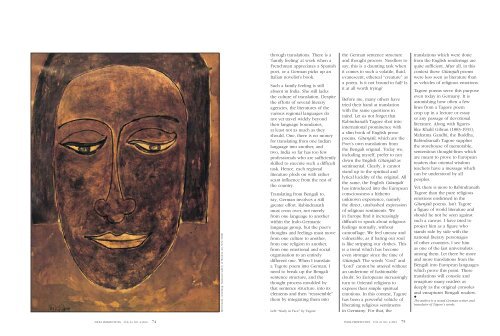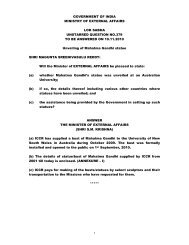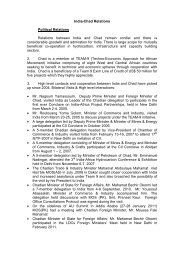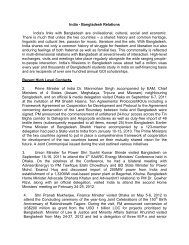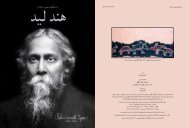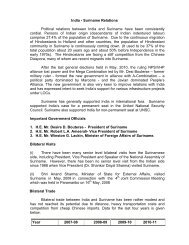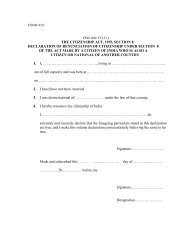IP_ Tagore Issue - Final.indd - high commission of india mauritius
IP_ Tagore Issue - Final.indd - high commission of india mauritius
IP_ Tagore Issue - Final.indd - high commission of india mauritius
Create successful ePaper yourself
Turn your PDF publications into a flip-book with our unique Google optimized e-Paper software.
Mit freundl. Genehmg: National Gallery <strong>of</strong> Modern Art, New Delhithrough translations. There is a‘family feeling’ at work when aFrenchman appreciates a Spanishpoet, or a German picks up anItalian novelist’s book.Such a family feeling is stillabsent in India. She still lacksthe culture <strong>of</strong> translation. Despitethe efforts <strong>of</strong> several literaryagencies, the literatures <strong>of</strong> thevarious regional languages donot yet travel widely beyondtheir language boundaries,at least not as much as theyshould. One, there is no moneyfor translating from one Indianlanguage into another, andtwo, India so far has too fewpr<strong>of</strong>essionals who are sufficientlyskilled to execute such a difficulttask. Hence, each regionalliterature plods on with ratherscant influence from the rest <strong>of</strong>the country.Translating from Bengali to,say, German involves a stillgreater effort. Rabindranathmust cross over, not merelyfrom one language to anotherwithin the Indo-Germaniclanguage group, but the poet’sthoughts and feelings must movefrom one culture to another,from one religion to another,from one emotional and socialorganisation to an entirelydifferent one. When I translatea <strong>Tagore</strong> poem into German, Ineed to break up the Bengalisentence structure, and thethought process moulded bythat sentence structure, into itselements and then “reassemble”them by integrating them intoLeft: “Study in Face” by <strong>Tagore</strong>the German sentence structureand thought process. Needless tosay, this is a daunting task whenit comes to such a volatile, fluid,evanescent, ethereal “creature” asa poem. Is it not bound to fail? Isit at all worth trying?Before me, many others havetried their hand at translationwith the same questions inmind. Let us not forget thatRabindranath <strong>Tagore</strong> shot intointernational prominence witha slim book <strong>of</strong> English prosepoems, Gitanjali, which are thePoet’s own translations fromthe Bengali original. Today we,including myself, prefer to rundown the English Gitanjali assentimental. Clearly, it cannotstand up to the spiritual andlyrical lucidity <strong>of</strong> the original. Allthe same, the English Gitanjalihas introduced into the Europeanconsciousness a hithertounknown experience, namelythe direct, unabashed expression<strong>of</strong> religious sentiments. Wein Europe find it increasinglydifficult to speak about religiousfeelings normally, withoutcamouflage. We feel uneasy andvulnerable, as if baring our soulis like stripping our clothes. Thisis a trend which has becomeeven stronger since the time <strong>of</strong>Gitanjali. The words “God” and“Lord” cannot be uttered withoutan undertone <strong>of</strong> fashionabledoubt. So Europeans increasinglyturn to Oriental religions toexpress their simple spiritualemotions. In this context, <strong>Tagore</strong>has been a powerful vehicle <strong>of</strong>liberating religious sentimentsin Germany. For that, thetranslations which were donefrom the English renderings arequite sufficient. After all, in thiscontext these Gitanjali poemswere less seen as literature thanas vehicles <strong>of</strong> religious emotions.<strong>Tagore</strong> poems serve this purposeeven today in Germany. It isastonishing how <strong>of</strong>ten a fewlines from a <strong>Tagore</strong> poemcrop up in a lecture or essayor any passage <strong>of</strong> devotionalliterature. Along with figureslike Khalil Gibran (1883-1931),Mahatma Gandhi, the Buddha,Rabindranath <strong>Tagore</strong> suppliesthe storehouse <strong>of</strong> memorable,sententious thought-lines whichare meant to prove to Europeanreaders that oriental wisdomteachers have a message whichcan be understood by allpeoples.Yet, there is more to Rabindranath<strong>Tagore</strong> than the pure religiousemotions enshrined in theGitanjali poems. Isn’t <strong>Tagore</strong>a figure <strong>of</strong> world literature andshould he not be seen againstsuch a canvas. I have tried toproject him as a figure whostands side by side with thenational literary personages<strong>of</strong> other countries. I see himas one <strong>of</strong> the last universalistsamong them. Let there be moreand more translations from theBengali into European languageswhich prove this point. Thesetranslations will console andenrapture many readers asdeeply as the original consolesand enraptures Bengali readers.◆The author is a noted German writer andtranslator <strong>of</strong> <strong>Tagore</strong>’s works.INDIA PERSPECTIVES VOL 24 NO. 2/2010 74 INDIA PERSPECTIVES VOL 24 NO. 2/2010 75


